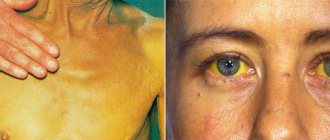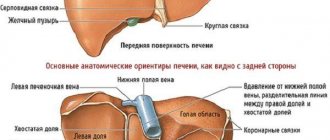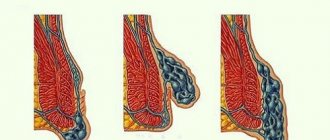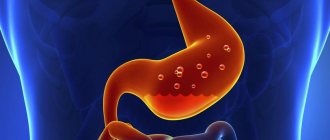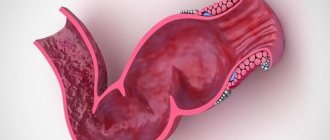Predisposing factors
Inflammation of the kidneys in men is caused by infectious, chemical causes, psycho-emotional stress, and exposure to low temperatures.
Factors predisposing to kidney disease include:
- disturbance of urine outflow;
- developmental anomalies of the urinary system;
- chronic inflammatory processes in the genitourinary system, in which the infection penetrates the kidneys through an ascending route;
- foci of persistent infection (sinusitis, tonsillitis), from where the pathogen enters the kidneys through the blood or lymph flow;
- hypothermia;
- instrumental diagnostic methods (cystoscopy, retrograde urography).
To find out the reasons why the kidneys began to hurt, the doctor conducts a survey and examination, and prescribes additional laboratory and instrumental examinations.
Treatment methods: how to treat inflammation in men?
How to treat kidney inflammation in men with certain symptoms? Before prescribing a therapeutic regimen, the subtype of the lesion and the root cause of the abnormalities are determined. Exacerbation stages of existing chronic forms are carried out in a hospital setting, with constant monitoring by medical personnel.
Common therapeutic indications include:
- bed or semi-bed rest;
- dietary table;
- drug therapy;
- phytotherapeutic effect.
Regardless of the complexity of the process, in the presence of mild symptoms, the patient is recommended to rest in bed. The disease progresses in stages and requires the right approach at the very beginning.
Drug therapy
Treatment includes a number of mandatory pharmacological drugs prescribed according to the symptomatic manifestations of the inflammatory process:
- antibacterial medications;
- antihistamines;
- vitamin therapy.
- antihypertensive drugs;
- glucocorticosteroids;
- immunostimulants – for complex forms of the disease;
- diuretics - to reduce the level of swelling;
- calcium preparations;
- agents that affect blood circulation and improve nutrition of kidney tissue;
- cytostatics;
Properly selected treatment improves the general condition of the patient within a week, and a month later his complete recovery is recorded. During therapy, laboratory parameters of blood and urine are constantly monitored.
General characteristics of kidney function and disease symptoms
The kidney filtration system consists of many glomeruli and tubules that allow salts, metal oxides, heavy halogens (bromine, chlorine), and dead phagocytes to pass through, leaving behind large volume molecules, usually protein compounds.
Kidneys also:
- maintain acid-base balance in the blood;
- control the body’s water balance;
- protect other organs of the endocrine system from the influence of harmful chemical compounds.
The first symptoms of the disease are pain, swelling and changes in urine parameters.
Glomerulonephritis
Glomerulonephritis is a more severe form of inflammation, which in 90% of patients is diagnosed in a chronic form and lasts for a long time (in some men, low-grade inflammation can last more than 10-15 years). The pathology is characterized by chronic edematous syndrome, asthenia, and increased blood pressure.
- What is doubling of the left kidney?
Kidneys with glomerulonephritis
Development of glomerulonephritis
Symptoms
Clinical manifestations of glomerulonephritis depend on the form of the disease and are listed in the table below.
Glomerulonephritis - a brief description of the disease
| Form of the disease | |
| Hypertensive | |
| Hematuric | |
| Nephrotic | |
| Urinary (latent) | |
| Combined | Clinical manifestations of all other forms of glomerulonephritis are characteristic |
Important! Symptoms of urinary dysfunction with pyelonephritis and glomerulonephritis are usually absent. If a man experiences false urge to empty the bladder or pain during urination, the cause is most likely infectious cystitis.
Symptoms and consequences of glomerulonephritis
Treatment
The disease is autoimmune in nature, so radical therapy is impossible. Outside of an exacerbation, in most cases, nephroprotection is used - a set of measures including drug correction, a special diet and lifestyle changes.
Video - Glomerulonephritis: diagnosis and treatment
Main symptoms
Compared to women, in men the intensity of symptoms due to renal pathologies progresses much faster, which allows them to respond to the discomfort that appears in the shortest possible time. Typical characteristic features are:
- fatigue and general weakness;
- headache;
- temperature increase;
- loss of appetite;
- sleep cycle disturbances;
- periodic chills;
- numbness in the legs;
- decreased salivation;
- nausea and vomiting;
- attacks of hypertension;
- dyspnea;
- increased sweating;
- pale skin;
- redness of the skin in the lumbar region;
- diarrhea;
- cloudy urine.
Sometimes spasms are felt that radiate to the scrotum. The temperature in such cases is difficult to control and is often accompanied by convulsions.
In some cases, the patient is tormented by attacks of thirst, which is difficult to satisfy. A man's sense of taste may change and an ammonia-like odor may appear from his breath.
The intensity of symptoms depends on the man’s immunity. If the acute symptoms have passed, and after a while they recur again, but less pronounced, this means that the disease has become chronic. In this case, the following accompanying symptoms are observed:
- weight loss;
- urinary complications;
- a noticeable decrease in daily urine volume;
- puffiness under the eyes, especially after waking up.
Chronic diseases are more difficult to treat, so bringing the process to this stage is fraught with complications.
Causes of kidney diseases
Heavy physical exertion on the body can provoke the disease.
Kidney diseases are preceded by various factors. Men are often subject to abnormalities in the functioning of the internal organ because they deal with physical stress. Diseases often arise due to poor drinking balance, which provokes the formation of stones and the presence of sand in the organs of the urinary system. Men who professionally engage in heavy sports are more likely to develop kidney disease.
In some cases, pathological processes in the internal organ are associated with the anatomical features of the urinary system. Kidney disease can be acquired in case of increased adrenal function. It is worth carefully monitoring the condition of the internal organs, since injuries and hematomas can cause serious illnesses. Kidney problems arise in the event of unfavorable genetics or blockage of an artery in the organ.
Return to contents
Classification and symptoms of pathology
Depending on the type of kidney inflammation in men, the clinical picture varies and the treatment also differs. Only an experienced doctor can identify a specific form of nephritis in men, after carrying out a series of diagnostic procedures.
Glomerulonephritis
With this disease, the kidney glomeruli are affected; the disease is of an immunoinflammatory nature. The pathology often develops against the background of a purulent sore throat caused by group A streptococcus.
Signs of kidney inflammation:
- blood is released along with urine;
- sometimes at the beginning of the pathology there is a complete absence of urine in the victim;
- swelling occurs on the face, in advanced cases it forms throughout the body;
- a sharp increase in blood pressure leads to frequent headaches and dizziness;
- patients often complain of pain of varying severity in the lumbar region.
Pyelonephritis
- Is it possible to eat before an ultrasound of the kidneys: diet before ultrasound diagnostics
The nonspecific form of the disease is characterized by damage to the pelvis and calyx of the kidney. The causative agent of this form of the inflammatory process is opportunistic microflora (staphylococci, Escherichia coli). Pyelonephritis is formed in two ways: ascending (bacteria enter from the underlying parts of the genitourinary system); descending (microorganisms are transported in the blood from existing foci of inflammation in the human body).
The clinical picture of pyelonephritis includes:
- sharp pain in the lumbar region, frequent renal colic;
- frequent, painful urination (especially against the background of cystitis);
- increased body temperature, headaches, intoxication of the body, general weakness, impaired potency.
Radiation nephritis
Progresses under the influence of prolonged exposure to ionizing radiation on the patient’s body. The disease leads to dystrophy of the epithelium of the renal tubules and its further atrophy. The pathology is usually chronic, accompanied by back pain, high blood pressure, and painful urination.
Interstitial
The interstitial tissue of the kidneys and tubules are affected. The disease develops against the background of long-term use of non-steroidal drugs and analgesics sold without a doctor’s prescription. The pathology is often accompanied by various rashes on the body and internal bleeding. Patients complain of fever of unknown etiology and general weakness.
Inflammation of the kidneys as a result of glomerulonephritis
This is a common problem that occurs somewhat less frequently than pyelonephritis, but poses the same danger to the body. The disease leads to problems with blood purification. Other health problems can cause the disease, such as:
- tonsillitis;
- acute respiratory infections;
- angina;
- ARVI.
As a rule, men do not treat these diseases for a long time, using only those medications that they can find in their home pharmacy, and only a few turn to specialists. On their own, they only try to eliminate those symptoms that interfere with their normal life, as a result of which the disease takes a serious turn. Inflammatory processes can spread to other systems of the body, which will certainly cause severe and lengthy treatment.
It is difficult to immediately determine glomerulonephritis, since specialists think about it last, because the main symptom of such a disease is absent, namely pain in the lumbar region. At the same time, it is important to prescribe the correct diagnostic measures, which will certainly help determine the correct cause of all symptoms. In addition, the disease has another list of symptoms:
- swelling in the eye area;
- high blood pressure;
- presence of sediment in urine;
- accumulation of fluid in the body, this occurs as a result of slow and incorrect filtration.
If these symptoms occur, you should immediately contact a medical facility; they may be accompanied by malaise, irritability and weakness. Only a urologist can make a full conclusion based on the tests performed.
Proper nutrition
Patients with any kidney disease are advised to limit their salt intake. The maximum allowable dosage of this product is 1.5 g/day. Try not to violate the drinking regime. Doctors recommend drinking at least 1.5 liters of clean water. For a speedy recovery, adhere to the following rules in your diet.
- Forget fried and stewed. All dishes must be prepared in a double boiler, boiled or baked in the oven.
- Rosehip decoctions, freshly squeezed juices and fruit drinks are useful for patients with nephritis.
- Smoked foods, sweet, spicy and salty foods are prohibited.
- Until complete recovery, give up legumes, radishes, and seaweed.
- If you suffer from severe swelling, drink a glass of milk with soda every day.
- The daily menu may include meat (lean), fresh herbs, fruits and vegetables.
A professional medical specialist should adjust your usual diet. Kidney inflammation is a dangerous disease that requires emergency treatment and rehabilitation of the patient.
Impaired functioning of this organ often leads to kidney failure and, as a consequence, a kidney transplant. If you do nothing, everything can end very sadly. With timely contact with specialists, the disease can be completely cured, without any negative consequences.
Kidney failure
Renal failure is a general term that unites any violation of all kidney functions, in which the organ cannot cope with the physiological load, and constant replacement therapy (hemodialysis) is required to maintain the vital functions of the body. Acute failure develops as a result of pathological effects on the kidneys of toxic and other factors. The condition can develop against the background of hemorrhagic, infectious, painful shock, as well as in case of severe drug poisoning, if the patient has taken a critical dose.
Kidney failure
Signs
Signs of acute renal failure in men include:
- Kidney cyst in men treatment with folk remedies
- critical decrease in daily diuresis (up to 400 ml per day);
- anemia;
- disturbance of water and electrolyte balance, manifested by edema and instability of blood pressure;
- constant feeling of thirst.
If the patient receives the necessary assistance in a timely manner aimed at eliminating the cause of the pathology, diuresis can be restored with minimal consequences for the vascular system, heart and hematopoietic organs.
Signs of chronic renal failure
In the absence of adequate therapy within 2-4 weeks, renal failure becomes chronic, and the patient develops typical clinical signs: constant weakness, sudden headaches, anemia. A man's blood pressure may rise and his sleep may be disturbed. With a stable decrease in immunity, the development of polyneuritis is possible - multiple lesions of the nerves of the peripheral nervous system.
Note! More rare symptoms of chronic renal failure are dyspeptic disorders, manifested by abdominal pain, indigestion, and stool instability. Approximately 3.8% of patients were diagnosed with itchy skin in the abdominal area, not associated with infectious lesions of the skin or internal organs.
Treatment
At an early stage, diuretics are used. For diabetic etiology, insulin preparations are prescribed. If the disease is complicated by manifestations of rheumatism, the use of glucocorticoids is indicated.
Video - Kidney failure
Kidney stone disease (nephrolithiasis)
Painful sensations become especially intense with specific ailments. They can also occur in the case of extensive mechanical damage (frostbite, burn, blow to the kidney area), but the main cause of all pain is one of the following ailments:
- hydronephrosis;
- disease of the ureters and bladder;
- manifestations of renal failure;
- pyelonephritis;
- nephroptosis;
- some other rare diseases.
Kidney pain is acute
The most common manifestation of these ailments is acute pain, the symptoms and treatment of which vary depending on the disease. When kidney function is impaired, the nerve endings of the organ are irritated. They transmit a signal to the brain about danger, thereby causing pain.
Most of the male population, faced with kidney problems, prefers to endure the unpleasant sensation. This is wrong behavior. Acute pain, pain, pulsation, twisting are signs of the transition of ailments to a life-threatening form. If the patient hesitates and chooses to wait without calling a doctor, the kidneys may be too severely damaged and will no longer be able to regenerate. The cost of delaying pain is the health of the whole body, the kidneys that will have to be transplanted, and even the life of the patient himself.
https://www.youtube.com/watch?v=https:_KLwEPmSbAk
Since organ transplantation is a procedure with a high risk to life, and the functioning of the body without kidneys is impossible, death is likely. Only timely consultation with a doctor will help reduce the risk of death and increase the likelihood of a complete cure of the damaged organ and adjacent tissues.
In addition to pain, a man may be bothered by a lack of appetite.
If adult men have kidney pain, it is often accompanied by other symptoms that cannot be ignored. Doctors note the following adverse reactions:
- increase in body temperature;
- general weakness;
- loss of appetite;
- weight loss;
- excessive sweating;
- disruptions in the process of urination (itching, burning, pain, discomfort in the bladder);
- swelling of the skin in the area of the affected kidney;
- decreased amount of urine excreted;
- development of swelling;
- increase in blood pressure.
A fairly common cause of pain in the lumbar region in men is kidney stones, in which stones form in various parts of the renal system. Manifestations of pathology depend on the size of oxalates and their location. Small stones and sand can be passed out painlessly in the urine, and the patient often does not even know about his illness.
We invite you to familiarize yourself with What is mycoplasma hominis and how is it transmitted?
If the size of the stones reaches 3 mm, the man notices characteristic symptoms, for example, pain when emptying the bladder. In chronic nephrolithiasis, without exacerbation, the pathology is manifested by moderate dull pain in the back and lower back. Urine tests may reveal traces of blood; less commonly, blood suspension is determined visually without the use of laboratory methods.
Urolithiasis from the inside
Symptoms
Exacerbation of kidney stones has pronounced symptoms, which include the following signs:
- acute cutting pain in the lateral part of the lower back with possible irradiation to the groin (renal colic);
- pain syndrome of a spastic nature, the predominant localization of which is also the lower lumbar region;
- vomiting and nausea (often against the background of normal body temperature);
- the appearance of drops of blood, mucous streaks and blood suspension in the urine.
Symptoms of urolithiasis
Treatment
Treatment of nephrolithiasis involves a salt-free diet, taking drugs with analgesic and antispasmodic effects (Drotaverine, Papaverine, Baralgin, Spazmalgon), diuretics (Furosemide). For large stones, surgical treatment is used.
Types of kidney stones
Pathology is the formation of stones formed from substances dissolving in urine. Stones cause aching, dull pain in the lower back in men, and blood is sometimes observed in the urine. The pain becomes more intense when walking or turning the body, and is felt on one side. In case of urolithiasis of the kidneys, stones can be excreted on their own after severe colic.
When sand is deposited in the organ, a representative of the stronger sex feels discomfort in the lumbar region of the back, abdomen, groin, and navel. Urination is frequent and painful, urine may be cloudy or dark. Patients often complain of vomiting, high fever, high blood pressure, swelling and general malaise. Sand tends to come out on its own, which causes pain when emptying.
Several procedures are actively used in the treatment of urolithiasis: lithotripsy, laparoscopy, endoscopy. When the stones are not large and consist of soluble salts, specialists use medications that can break them down. If the kidneys hurt and the symptoms in men do not go away, and the examination showed the presence of coral stones or a severe stage of the disease, open surgery is performed.
Each patient must follow a certain diet for urolithiasis. This is necessary for any method used to treat pathology.
Probable causes
Nephritis in men is formed against the background of various unfavorable factors. The pathology can be primary (appears as a result of kidney disease, for example, with urolithiasis) and secondary.
Nephritis actively progresses as a result of exposure to certain circumstances on the patient:
- weakened immunity. Doctors note an outbreak of kidney inflammation in the autumn-spring period, when the body is most vulnerable;
- excessive physical activity or its complete absence;
- constant suppression of the urge to empty the bladder (observed in men who have sedentary work);
- the course of chronic inflammatory processes in the body;
- unbalanced diet, drinking insufficient amounts of fluid (constant dehydration);
- the presence of inflammatory processes in the male reproductive system;
- hypothermia;
- poisoning by various poisons (heavy metals, chemicals);
- the presence of cancer, chronic alcoholism.
Acute nephritis is formed against the background of damage to the kidney tissue by various pathogenic microorganisms (streptococci, Escherichia coli, Proteus, coccal infection). The chronic form of the disease is often a consequence of acute kidney inflammation, lack of or improper treatment.
Less commonly, the pathology develops independently, for example, against the background of long-term use of potent medications (non-steroidal anti-inflammatory drugs, analgesics). Very often, chronic nephritis is diagnosed against the background of cancer.
Find out the instructions for using the drug Uronefron for urological problems.
For a review and characteristics of tablets for urinary incontinence in women, see this address.
The use of injections for inflammation
In addition to drug treatment, a specialist can also prescribe injections for kidney inflammation. They are used only in extreme cases; they are fast-acting, as they quickly enter the body.
To treat kidney inflammation with injections, use:
- Tsiprobay - used for uncomplicated infections of the upper and lower urinary tract. Use 100 mg intravenously. 2 times a day, for complicated infections, 200 mg. It is not recommended for use during the lactation period and during pregnancy, as well as in the presence of sensitivity to ciprofloxacin;
- Tsifran - use 500 mg. every 12 hours. Contraindications: pregnancy, lactation, sensitivity to fluoroquinolones, adolescence up to 16 years.
It is important! To prescribe the correct course of treatment, if there are primary signs of the disease, you must consult a specialist, take tests and conduct the necessary research.
Diagnostics
To differentiate one disease from another, a comprehensive examination is carried out. The following methods are prescribed:
- Blood test (to determine white blood cell counts, hemoglobin and erythrocyte sedimentation rate);
- Urinalysis. Detects pathogenic microflora, protein concentration, as well as crystals of salt compounds.
- Ultrasound. Allows you to examine the kidneys in detail, identify tumors and their size and location.
- MRI (magnetic resonance imaging). Reveals all structural changes in the organ.
- CT scan. Makes it possible to detect developmental anomalies, stones, and neoplasms.
- X-rays with contrast are used to study blood flow in the kidneys.
- Biopsy. It is used to study the nature of tumors and identify pre- and cancerous formations.
Sources used:
- https://simptom.info/nefrologiya/vospalenie-pochek-simptomy-u-muzhchin
- https://urohelp.guru/pochki/obshee/simptomy-u-muzhchin.html
- https://zdravman.com/kidneys-bladder/symptoms-kidney/pochki-simptomy-bolezni-i-lechenie.html
- https://stomach-info.ru/bolezni-pochek/drugie-bolezni-pochek/priznaki-zabolevaniya-pochek-u-muzhchin.html
- https://etopochki.ru/kidney/bol/priznaki-bolezni-pochek-u-muzhchin.html
- https://vseopochkah.com/bolezni/simptomy/vospalenie-pochek-u-muzhchin.html
- https://uran.help/diseases/vospalenie-pochek-simptomy-u-muzhchin.html
- https://1opochkah.ru/bolezni/simptomy-i-lechenie-boleznej-pochek-u-muzhchin.html
Treatment methods
Pathology can be treated using several methods. For inflammatory processes, antibacterial therapy is prescribed. Antispasmodics are prescribed for pain. The medicinal complex includes vitamins and agents that restore the immune system. When stones form, drugs that dissolve them, as well as diuretics, are prescribed.
We suggest that you familiarize yourself with what medications for cystitis are available for cats.
Diet food
The diet should include healthy foods that contain small amounts of protein and fat. It is worth reducing your salt intake and increasing the amount of daily fluid. Meals should be fractional: it is recommended to eat often, but in small portions. Low-fat dairy products, vegetable broths, lean meat and fish are allowed. Food should be steamed or consumed boiled.
Pathology can be treated with folk remedies, but before using them you should consult a doctor. The following remedies are effective in the fight against inflammatory diseases in the kidneys: celery juice, tansy flowers, bean pods, horsetail infusion. Folk remedies such as knotweed, dill seeds, half-pol and others can cleanse the kidneys and organs of the genitourinary system.
How to treat kidney inflammation? Nephritis in men is a serious problem that requires immediate treatment.
Important! Taking any medication on your own is strictly prohibited. Only a specialist, after carrying out a series of diagnostic measures, will prescribe the necessary course of therapy that is suitable for you.
First aid
In case of acute pain due to kidney inflammation, it is recommended to call an ambulance. While waiting for doctors, it is not recommended to take strong painkillers, which can distort the clinical picture and complicate the diagnosis of pathology. The best option is to take a warm bath; hot water helps relieve pain and eliminate muscle spasms.
Treatment of kidney inflammation in men involves the use of vitamin-containing preparations (including calcium, thiamine, riboflavin). Therapy at home is prohibited; treatment of nephritis should be carried out under the strict supervision of doctors.
Effective drugs for the treatment of kidney inflammation:
- Cyclophosphomide. Available in tablet form, take on an empty stomach with a small amount of mineral water. It is prohibited to use the medication in the presence of cancer or nephrosis. The drug must be accompanied by a diet and the use of diuretics;
- Ceftriaxone. It is administered intramuscularly or intravenously. The daily intake for an adult should not exceed 4 grams. Prescribe with caution to patients with diabetes.
Additionally, the patient is prescribed:
- anti-inflammatory drugs. Medicines stop the inflammatory process and relieve swelling. Anti-inflammatory drugs are taken in short courses; for nephritis, the following are used: Norfloxacin, Ciprofloxacin, Verapamil;
- antibiotics for kidney inflammation. Aimed at destroying pathogenic microflora that caused the inflammatory process. The specific dosage and duration of therapy are prescribed by the doctor. Amoxicillin, Penicillin, Cephalexin are often used;
- antihistamines help limit the formation of antibodies to kidney tissue (Suprastin, Zyrtec);
- diuretics. Helps remove harmful substances from the body (Diacarb, Furosemide).
Hemodialysis
It is a special procedure by which a special machine purifies the patient’s blood. It is prescribed in serious situations if the kidneys cannot cope with their functions. Hemodialysis cleanses the victim's body of metabolic products and improves the patient's well-being. The measure is temporary; the patient requires a kidney transplant.
Treatment of kidney inflammation with folk remedies:
- healing collection. Combine coltsfoot grass, yarrow, St. John's wort, nettle, and centaury in equal proportions. Pour a tablespoon of the resulting mixture with a glass of boiling water, let it brew for one hour. Strain the product, take half a glass twice a day, the course of therapy should last at least 25 days;
- decoction. Grind flax seeds, strawberries, stinging nettle, and birch leaves in equal proportions. Pour a glass of boiling water over a teaspoon of the resulting mixture and simmer for a quarter of an hour. Strain the resulting product, divide into two parts, take in the morning and evening. The duration of treatment depends on the patient’s condition and the severity of unpleasant symptoms;
- parsley. Finely chop two thick parsley roots, add half a liter of water and the same amount of milk. Boil the product a little, judge, strain. Take the decoction 100 ml per day, the course of therapy lasts a month, after 30 days it is repeated.
In order to distinguish one kidney disease from another, similar in clinical picture, complex diagnostics are used. Main types of research:
- Ultrasound. This method is based on the use of ultrasound, which allows you to see a detailed picture of the condition of the kidneys. At the same time, tumors of benign and malignant origin, cysts, stones, as well as the slightest structural changes can be detected on the computer screen.
- Blood analysis. With kidney disease in men, hemoglobin may decrease, the number of leukocytes increases, and ESR increases.
- Analysis of urine. Bacteria and a large amount of protein are often found in urine, and the level of leukocytes increases. Blood and crystals of various salt compounds are often present.
- MRI. Magnetic resonance imaging can reveal structural changes in the kidneys. In this case, it is possible to obtain images of each layer of the organ, which helps the doctor make an accurate diagnosis.
- CT. Computed tomography is similar in principle to magnetic resonance imaging, but is inferior to this method. CT scans can detect tumors, congenital anomalies, and the presence of stones.
- X-ray with contrast. Used to examine blood flow in the kidneys. In many diseases it is disrupted. During the study, a contrast agent is injected into the artery that supplies the organ, which appears on X-ray images.
- Biopsy. Used to detect malignant tumors and precancerous conditions. A small piece of organ tissue is sent to the laboratory, where it is examined for the presence of atypical cells.
Drug therapy is most often used to treat kidney disease in men. If the pathology is advanced or the drugs do not have the desired effect, surgical intervention is resorted to. Folk remedies are used as an additional method of treatment. Dietary nutrition can improve kidney function, relieving them of unnecessary stress. Physiotherapy methods speed up recovery.
Groups of drugs that are used for kidney diseases in men:
- Antibacterial: Furadonin, Ceftriaxone, Cefotaxime, etc. Destroy pathogenic microflora, destroying bacterial cell membranes. Used for infectious, purulent-necrotic and inflammatory kidney diseases.
- Anti-inflammatory: Cyston, Canephron, etc. Improve kidney function, providing an antiseptic effect. Reduce the intensity of inflammation, stimulating tissue repair. Used for urolithiasis, purulent-necrotic, inflammatory, metabolic and infectious pathologies.
- Diuretics: Furosemide, Urolesan, etc. Used for urolithiasis, inflammatory and infectious diseases. The drugs in this line increase the amount of urine, which increases the urge to urinate.
- Dissolving stones: Phytolysin, Blemaren, Allupol, etc. Used in the presence of sand and stones in the kidneys. Reduces uric acid levels, softening stones and promoting their removal.
- Painkillers: Tempalgin, Baralgin, etc. Used for attacks of renal colic during the passage of a stone or when it gets stuck in the ureter, as well as for pyelonephritis, which is accompanied by intense symptoms.
- Antispasmodic: No-shpa, Spazmalgon, etc. Relax smooth muscles, relieving pain. Used for urolithiasis, inflammatory and infectious kidney pathologies.
- Antituberculosis: Rifampicin, Isoniazid, etc. They have a bactericidal effect. They are active against the tuberculosis bacillus, suppressing its vital activity. Used for kidney damage by this type of pathogen.
We invite you to familiarize yourself with Smear of a bad reason

